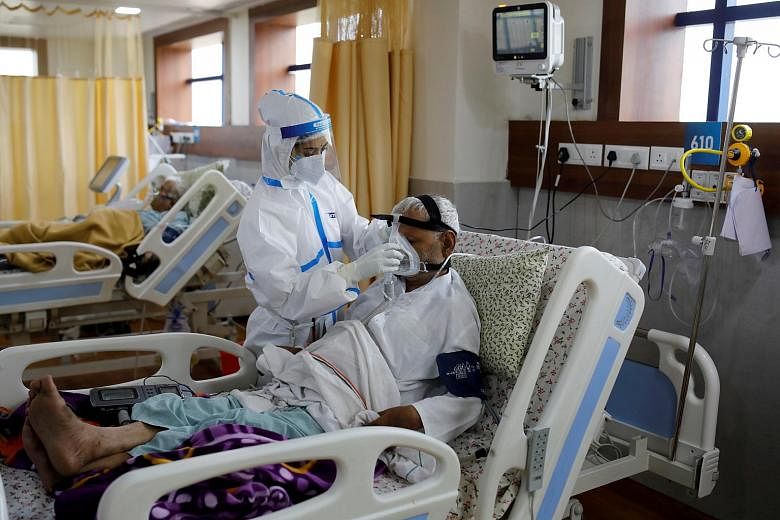NEW DELHI - It is not only the possibility of contracting the coronavirus that has Dr Rohit Tiwari worried.
He is also stressed about being able to pay his rent on time this month.
The 31-year-old paediatrician works at Hindu Rao Hospital, a Covid-19 designated government hospital in Delhi.
And just like his colleagues and other healthcare workers, he has not been paid since June.
The hospital, which is run by the Municipal Corporation of Delhi (MCD), is going through a funding crunch exacerbated by the Covid-19 pandemic that has hurt revenues but also because funds are being blocked by the Delhi government, said North Delhi Municipal Corporation Mayor Jai Prakash.
The Delhi government has denied the charges.
Health workers who have not been paid since June 18 are going on protest from Saturday (Oct 3). They have been running an online campaign to highlight their troubles.
"Since the pandemic (started), salaries have been grossly irregular. We haven't got our salary in 109 days," said Dr Tiwari, who has also been on Covid-19 testing duties.
"I am on the verge of borrowing again (to pay for rent) from my parents if it (salary) doesn't come in the next 15 to 20 days. It is obviously tough. Everyone is working and this situation takes a toll."
As the coronavirus pandemic rages on in India, health care workers from doctors to nurses have been feeling the strain.
Some have had to cope with irregular salaries or even salary cuts. Others, with the high number of infected patients which has been severely testing the health infrastructure in the South Asian country.
In the southern state of Kerala, 900 junior doctors, appointed for three months for Covid-19-related duties, threatened to resign after they were not paid their full salaries on time. The Kerala government has now assured them that they would get paid in full and on time, a doctor said.
India is the second most affected country in the world with 6.39 million Covid-19 cases. At least 80,000 new cases are recorded daily. The recovery rate remains high and the death rate low compared with the population but healthcare infrastructure has come under strain.
And the effects are showing.
A recent survey of healthcare workers from across India, which was carried out by doctors in the southern city of Bengaluru, found that 70 per cent of the 2008 surveyed said they experienced trauma and they felt pessimistic and anxious.
These feelings were further exacerbated as many were self-isolating to protect their families from potential infection.
Healthcare spending in India has increased but still remains low at 1.28 per cent of the country's GDP, one of the lowest in the world.
Public hospitals and health care centres in rural areas are overcrowded and scarce, with people having to travel long distances for basic medical care.
The country also faces a shortage of medical staff - from doctors to nurses and paramedics - with many preferring to work in the more lucrative private sector. There are just 840,130 medical practitioners for a population of 1.35 billion. By World Health Organisation standards, there should be 2.4 million doctors in a country as populous as India.
"Under the circumstances, I would give so much credit to medical professionals in India. Some of the best countries in terms of medical infrastructure, like Spain, Italy and the US, have struggled because of Covid," said Mr Arvind Singhal, chairman and managing director of management consulting firm Technopak.
"Healthcare workers at the best of times lead a very, very stressful life and are overburdened, working 10 to 12 hours. It (Covid-19) has increased the stress. On top of it, a lot of them lost their lives."
At least 500 doctors, including 62 from Tamil Nadu, have succumbed to Covid-19, according to the Indian Medical Association.
It has demanded that doctors be treated as "martyrs", even as they have urged the government to put together a database of other health workers.
At Delhi's Safdarjung Hospital, doctors have been working without leave since March.
"We are all exhausted. Since it is our moral responsibility, we have to do this and we have stopped thinking about when this (pandemic) will be over," said Dr Manish Kumar, president of the resident doctors' association at Safdarjung Hospital.
Some 16 doctors and nurses at the hospital have tested positive for Covid-19.
"The fear of catching the infection has not gone. But we no longer look at whether the coronavirus figures are going up or down. We just go on with our work," said Dr Kumar.












